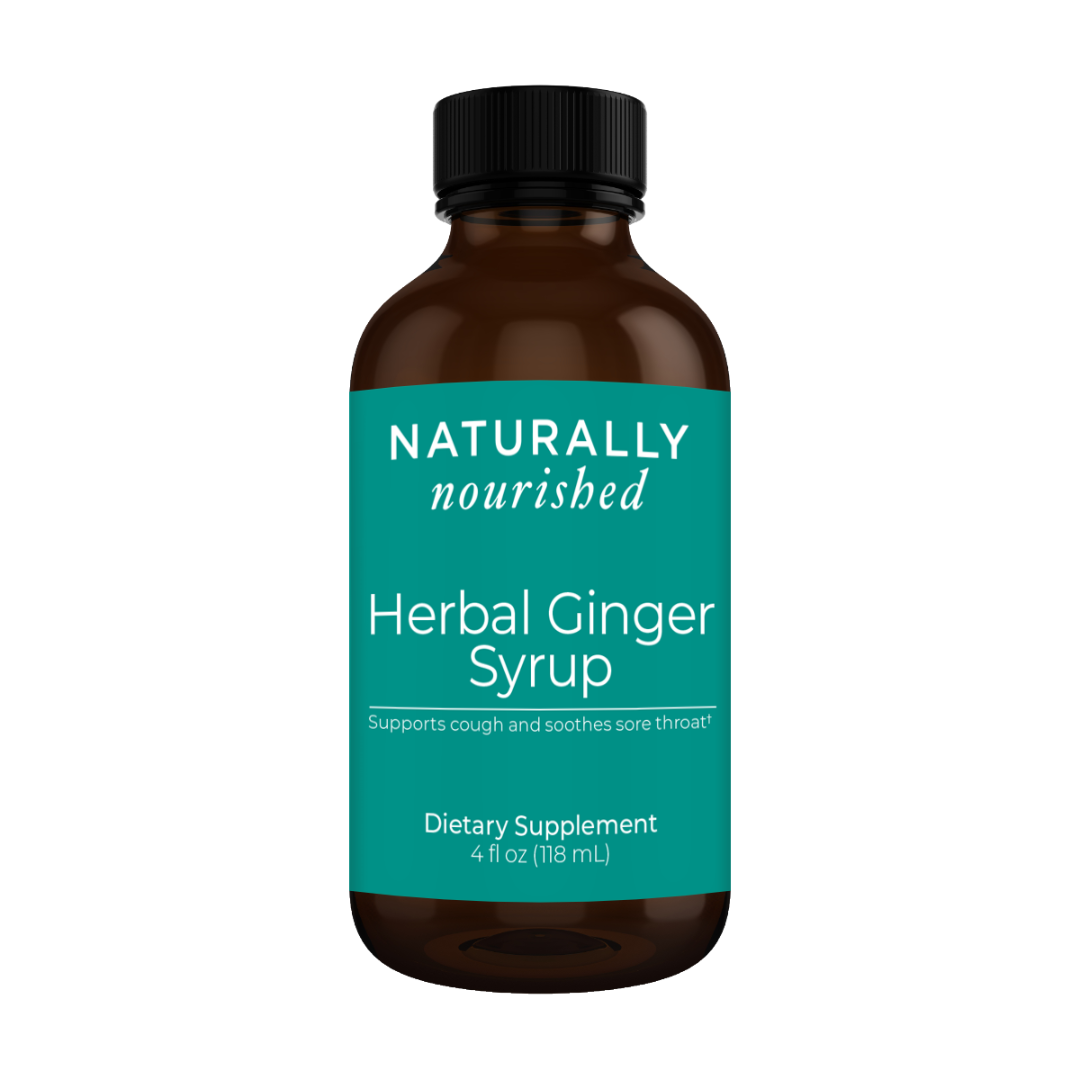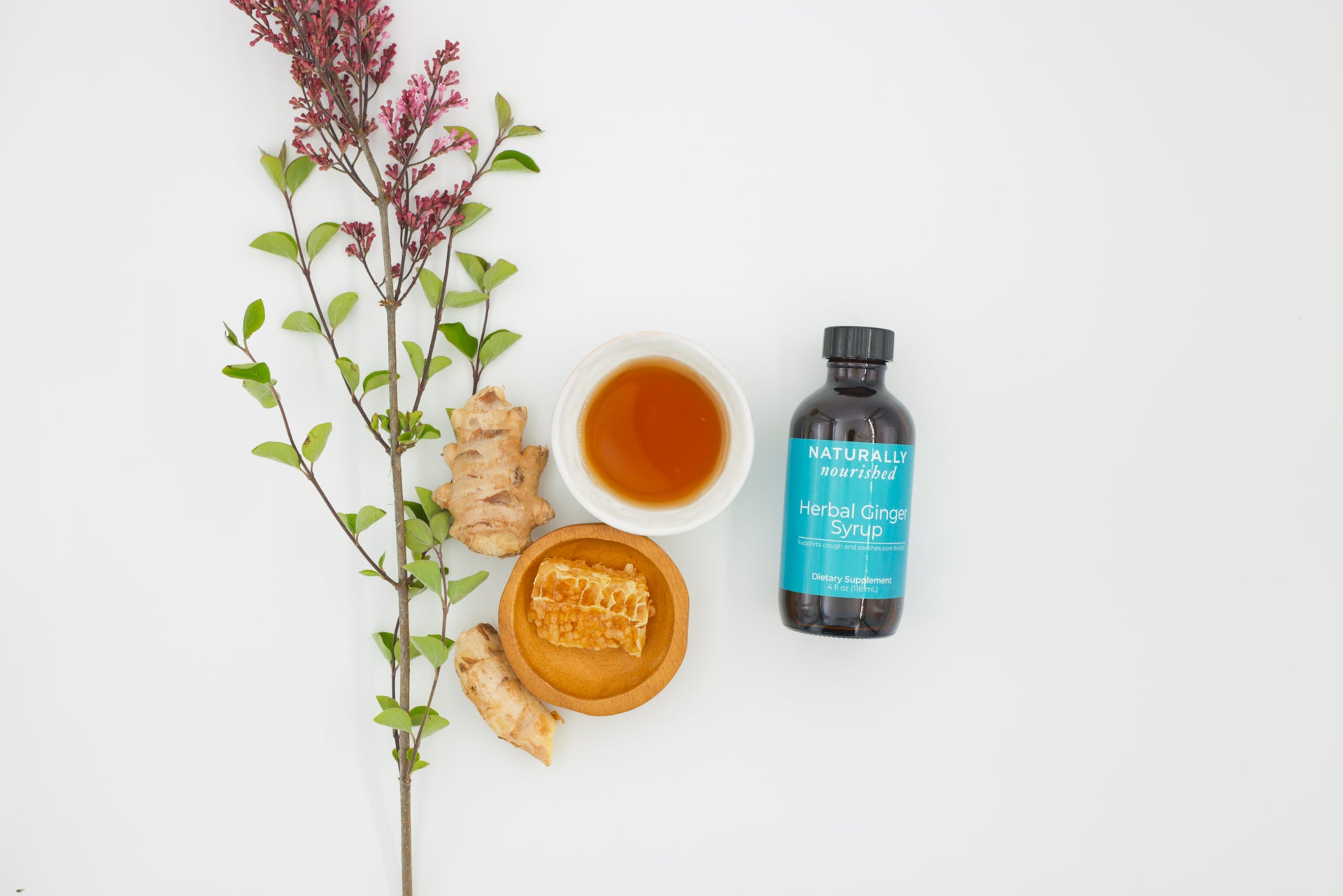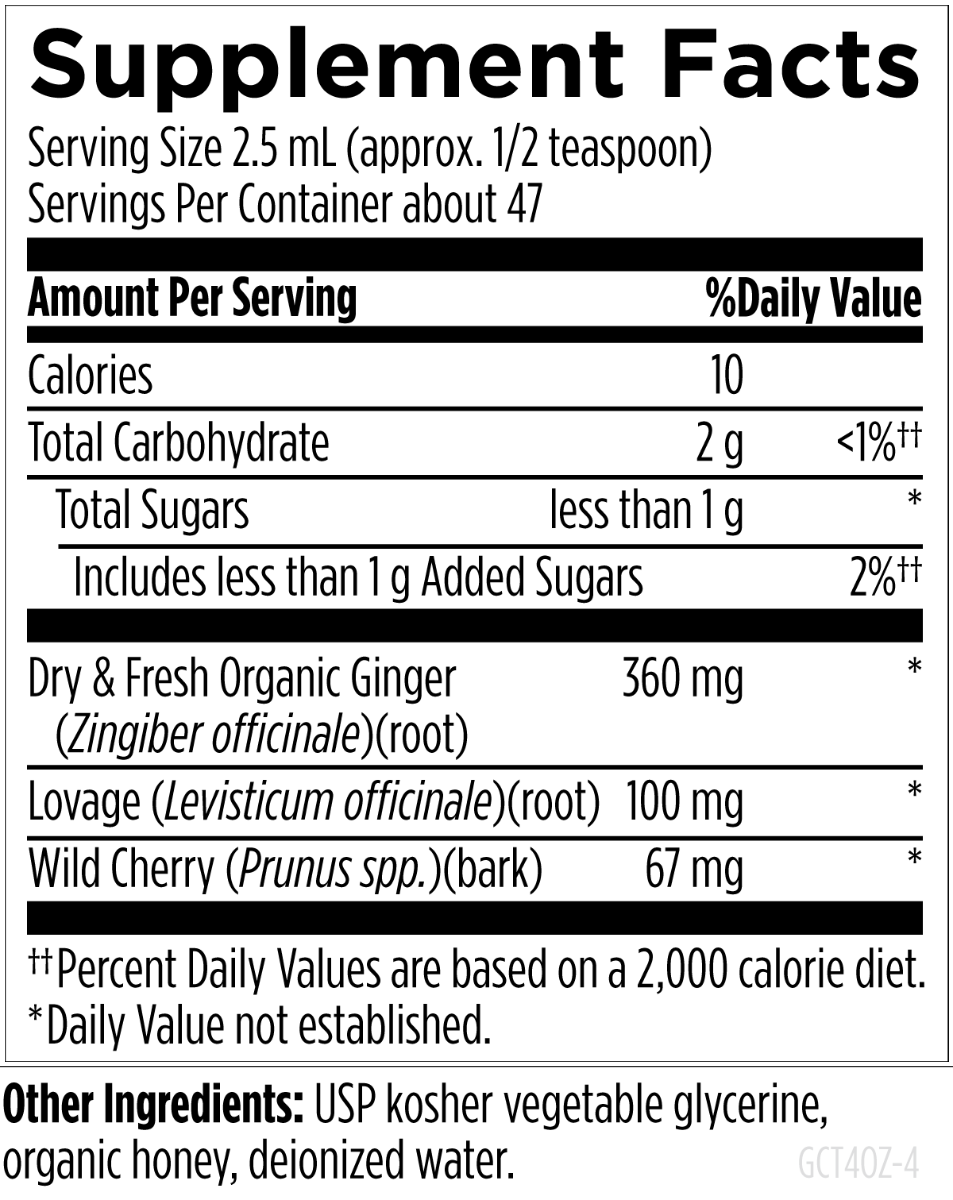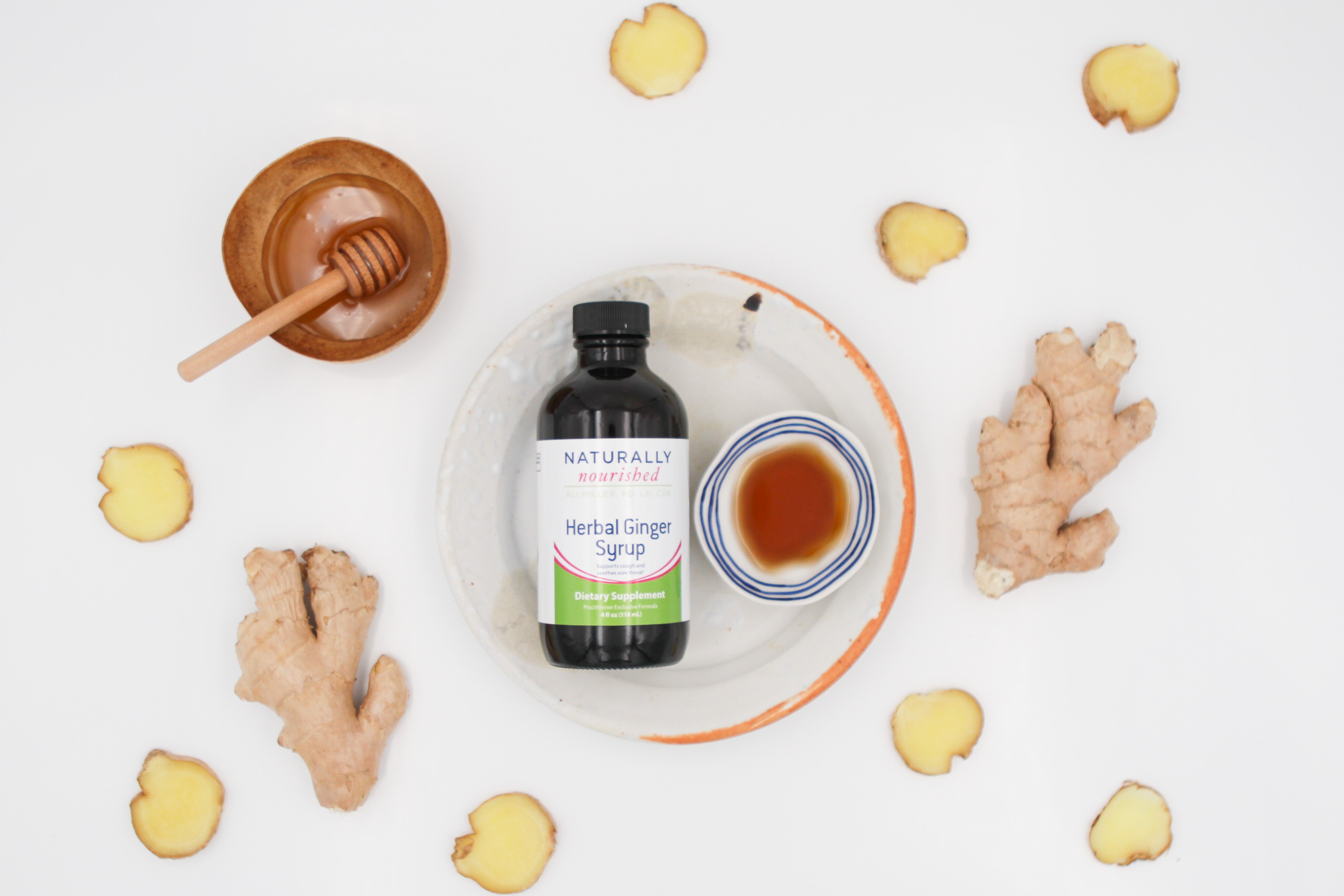


Herbal Ginger Syrup
A delicious, soothing syrup for sore throat, cough, and immune support
For wellness:
Toddlers, 1/4 mL
Kids Age 3-11, 1/2 mL
Age 12+ through adult, 1mL
For illness:
Toddlers 2mL
Kids Age 3-11 3mL
Age 12+ through adult 4-5mL
Contains 4 fl oz or 47 servings, intended for occasional immune support
Safety
- Safe with breastfeeding
- Safe during pregnancy
-
Safe for Kids
Learn more



Benefits of Herbal Ginger Syrup
- Soothes Sore Throat
- Support for Cough
- Aids in Immune Response
- Provides Relief from Pain and Irritation
- Expectorant to Loosen Mucus and Phlegm
- Anti-microbial Effects
- Support for Occasional Nausea and Morning Sickness
Herbal Ginger Syrup is formulated as a sore throat and cough remedy. This throat-soothing elixir contains all-natural herbal ingredients in a base of vegetable glycerine with organic honey, and boasts a potent and pleasant ginger flavor.
The three organic herbal ingredients in Herbal Ginger Syrup—ginger, lovage, and wild cherry bark—have been shown to support the immune response, aid suppression of occasional cough, and provide relief from the pain and irritation that may be associated with cough and sore throat, without the adverse side-effects of pharmaceutical drugs commonly used for this purpose.
* These statements have not been evaluated by the Food and Drug Administration. This product is not intended to diagnose, treat, cure or prevent any disease.
What Makes Herbal Ginger Syrup Superior?



Benefits
Highlights of Herbal Ginger Syrup:
- 360 mg of dry and fresh organic ginger per serving to promote a healthy inflammatory response
- Organic honey to support cough
- 100 mg of lovage per serving to support antioxidant status and immune function
- 67 mg of wild cherry bark per serving to support antioxidant status and a normal immune response
- Sweetened with USP Kosher vegetable glycerine and certified organic honey for a delicious taste
Herbal Ginger Syrup is a pleasant-tasting, herbal syrup elixir that supports immune function and cough. It is formulated with a blend of dry and fresh organic ginger containing bioactive compounds that promote a healthy inflammatory response. Lovage and wild cherry are included to support immune function and antioxidant status. The base of this syrup is USP Kosher vegetable glycerin and certified organic honey. These ingredients also help to soothe the throat and promote a normal immune response.
Ginger promotes a healthy inflammatory response and supports antioxidant status in the body, which helps promote a normal immune response. Ginger may have properties that help to support a healthy immune response. Bioactive compounds in ginger along with organic honey may support the occasional cough.
Lovage contains bioactive polyphenol and naturally occurring organic plant compounds that may support antioxidant status and immune function. Lovage may also have properties that help support the body’s immune response. Wild cherry bark features bioactive compounds, including polyphenols, carotenoids, anthocyanins, and terpenes that support antioxidant status in the body.
*These statements have not been evaluated by the Food and Drug Administration. This product is not intended to diagnose, treat, cure or prevent any disease.
How to Use
For wellness:
Toddlers 10 drops
Kids Age 3-11 20 drops
Age 12+ through adult 35 drops (1mL)
For illness:
Toddlers 2mL
Kids Age 3-11 3mL
Age 12+ through adult 4-5mL
Research
Ginger
Ginger root (Zingiber officinale) is well-regarded for its anti-inflammatory, antimicrobial and immune-supportive properties. In combination with the general warming sensation induced by the strong, spicy flavor, these properties all contribute to ginger being beneficial for soothing inflamed and irritated tissue in the throat, and relieving the pain induced by coughing.
Specific constituents in ginger extract may make this herb especially helpful as an herbal cough remedy. Citral, the major active compound in ginger oil, was identified as suppressing contraction of the trachea and contributing to bronchodilation in a rat model.(1)
Other studies support ginger’s use for respiratory ailments. Extracts of fresh ginger were shown to be effective against human respiratory syncytial virus (HRSV) in human upper and lower respiratory tract cells in vitro. (2)
The ginger dose-dependently inhibited viral attachment and internalization. The study’s authors speculated that concentrated ginger might stimulate mucosal cells to secrete IFN-ß, which could contribute to counteracting viral infection. Antibacterial properties of ginger have been demonstrated against strains of Staphylococcus and Streptococcus, as well as the gram-negative bacterium Haemophilus influenza, isolated from human cells in vitro. (3)
Ginger has also been shown to boost non-specific immune response in a mouse model of immunosuppression and subsequent infection. Ginger extract induced differentiation and viability of macrophages, and led to greater release of pathogen-targeting nitric oxide from macrophages. Ginger also increased expression of cell adhesion molecules on macrophages, enhancing their ability to bind to and engulf pathogenic organisms. Phagocytic capacity was increased in the presence of ginger extract, leading the study authors to put forth two possible mechanisms: first, ginger may support normal functioning of existing macrophages, and second, it may induce production of an increased total number of macrophages. (4)
Treatment with ginger extract also restored production of pathogen-targeting reactive oxygen intermediates induced by myeloperoxidase, which was greatly suppressed in immunecompromised cells without ginger. The study authors concluded that ginger exhibits potent bioactive properties that may ameliorate immunosuppressive conditions.
Wild Cherry Bark and Lovage
The bark of the wild cherry tree (Prunus serotina) is a traditional Native American remedy for colds, fever, and sore throat, the efficacy of which may now be supported by present-day research. The complex phenolic compounds in wild cherry, including chlorogenic acid and hyperoside, contribute to its antioxidant and antiinflammatory properties. (5)
Rat models have shown wild cherry to have significant effects as a vasodilator and smooth muscle relaxer, properties which may be instrumental in reducing the irritation associated with sore throat and cough.The impressive vasodilatory and endothelial-relaxing effects of wild cherry led the authors of a comprehensive review looking at the nutraceutical value of wild cherry to say that it could be considered a “functional food.” (6)
Lovage (Levisticum officinale) is an herb belonging to the Apiaceae botanical family, a category that also includes carrot, celery, coriander, dill, fennel, and parsley. Lovage leaves can be used in salads and the roots can be eaten as a vegetable or grated for use in salads, with a flavor and aroma similar to those of celery and parsley. Lovage is used as an expectorant and to loosen secretions in respiratory conditions. (7)
Traditionally, it has been used as a natural cough remedy, and research supports antimicrobial effects of lovage against Mycobacterium bovis, an agent that causes tuberculosis in animals and humans. (8)
References
1. Mangprayool T, Kupittayanant S, Chudapongse N. Participation of citral in the bronchodilatory effect of ginger oil and possible mechanism of action. Fitoterapia.2013 Sep;89:68-73.
2. Chang JS, Wang KC, Yeh CF, Shieh DE, Chiang LC. Fresh ginger (Zingiber officinale) has anti-viral activity against human respiratory syncytial virus in human respiratory tract cell lines. J Ethnopharmacol. 2013 Jan 9;145(1):146-51.
3. Akoachere JF, Ndip RN, Chenwi EB, Ndip LM, Njock TE, Anong DN. Antibacterial effect of Zingiber officinale and Garcinia kola on respiratory tract pathogens. East Afr Med J. 2002 Nov;79(11):588-92.
4. Chakraborty B, Sengupta M. Boosting of nonspecific host response by aromatic spices turmeric and ginger in immunocompromised mice. Cell Immunol. 2012 Nov;280(1):92-100.
5. K, Liggett JL, Kim NC, Baek SJ. Anti-proliferative effect of horehound leaf and wild cherry bark extracts on human colorectal cancer cells. Oncol Rep. 2006 Jan;15(1):275-81.
6. Luna-Vázquez FJ, Ibarra-Alvarado C, Rojas-Molina A, Rojas-Molina JI, Yahia EM, Rivera-Pastrana DM, RojasMolina A, Zavala-Sánchez MÁ. Nutraceutical value of black cherry Prunus serotina Ehrh. fruits: antioxidant and antihypertensive properties. Molecules. 2013 Nov 25;18(12):14597-612.
7. Natural Medicines Comprehensive Database. Lovage Monograph. Accessed Feb 23, 2018.
8. Guzman JD, Evangelopoulos D, Gupta A, et al. Antimycobacterials from lovage root (Ligusticum officinale Koch). Phytother Res. 2013 Jul;27(7):993-8.
